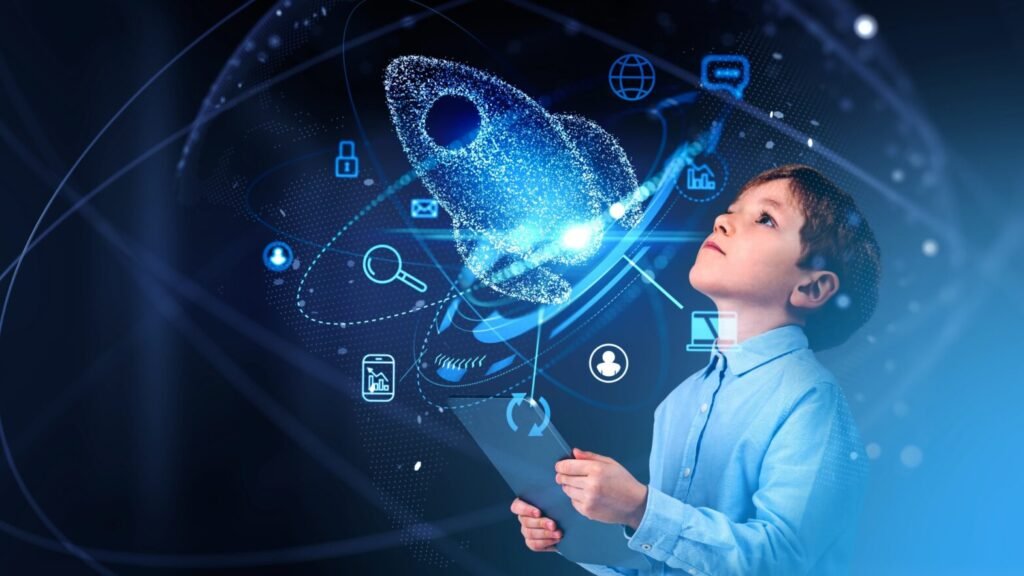One of the most profound impacts of technology is on global education. The COVID-19 pandemic accelerated the adoption of online learning platforms and remote classrooms. Platforms such as Coursera, Khan Academy, and edX have democratized access to world-class education, allowing anyone with internet access to learn from top universities and experts.
Developing countries are especially benefiting from this digital transformation. Mobile learning and low-bandwidth educational tools are helping bridge the literacy and skills gap in remote regions. In addition, AI-driven personalized learning is allowing educators to tailor lesson plans to individual student needs, improving outcomes and engagement.
Virtual reality (VR) and augmented reality (AR) are also being integrated into classrooms, providing immersive experiences that make learning more interactive and effective—from virtual science labs to 3D historical tours.
E-Governance and Smart Cities
Governments across the globe are embracing digital transformation to improve public services, transparency, and citizen engagement. E-governance tools enable citizens to pay taxes, access social services, and even vote using secure digital platforms.
Countries like Estonia have become global leaders in digital governance, offering almost all government services online. Similarly, India’s “Digital India” initiative aims to empower millions through digital infrastructure and literacy programs.
Smart city projects, using IoT (Internet of Things) technology, are emerging in cities like Singapore, Dubai, and Amsterdam. These initiatives use sensors, data analytics, and AI to optimize traffic flow, energy consumption, waste management, and public safety, making urban living more efficient and sustainable.
Tech Startups and the Global Innovation Economy
The rise of global startup ecosystems is fueling the next wave of innovation. From Silicon Valley to Shenzhen, Tel Aviv to Berlin, startups are challenging traditional industries with disruptive solutions.
India and Africa are witnessing a boom in tech entrepreneurship. Fintech, agritech, and healthtech startups are solving local challenges while attracting global investment. This decentralization of innovation is creating new economic opportunities and job markets beyond traditional tech hubs.
Accelerators, venture capital, and government incentives are further encouraging a culture of risk-taking and creativity, essential for a thriving innovation economy.
Cybersecurity: A Growing Global Concern
As technology becomes more integrated into every aspect of life, cybersecurity has emerged as a critical concern. Data breaches, ransomware attacks, and cyber-espionage are increasing in frequency and sophistication.
Governments, businesses, and individuals are investing heavily in cybersecurity infrastructure. AI and machine learning are being used to detect threats in real-time, while blockchain technology is being explored for secure transactions and data sharing.
Global cooperation is crucial, as cyber threats do not respect borders. Initiatives like the Paris Call for Trust and Security in Cyberspace aim to establish international norms and frameworks for digital safety.
Technology and Human Values
While innovation brings progress, it also raises ethical and philosophical questions. How do we ensure privacy in a world of surveillance? Should AI make life-and-death decisions in medicine or warfare? Who is accountable for algorithmic bias?
These questions highlight the importance of ethics in technological development. Universities, think tanks, and tech companies are forming ethics boards and guidelines to ensure human values remain central to innovation.
Moreover, inclusive design—technology that serves people of all backgrounds and abilities—is gaining traction. The goal is to make sure that tech development reflects the diversity of the global population it aims to serve.
Final Thoughts
The world is witnessing a technological renaissance. From AI and robotics to biotech and space exploration, innovation is reshaping societies, economies, and the human experience itself. However, with great power comes great responsibility.
As global citizens, we must ensure that technology serves humanity—not the other way around. That means investing in education, prioritizing ethics, embracing sustainability, and ensuring inclusivity. The future of global technology isn’t just about faster devices or smarter systems—it’s about creating a better, more connected, and more just world for everyone.




















